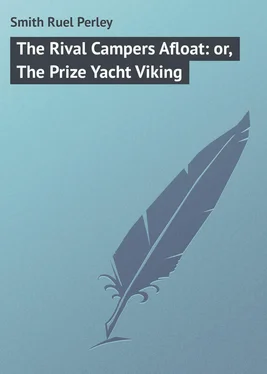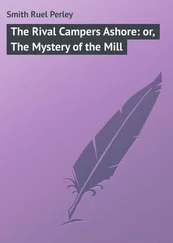Ruel Smith - The Rival Campers Afloat - or, The Prize Yacht Viking
Здесь есть возможность читать онлайн «Ruel Smith - The Rival Campers Afloat - or, The Prize Yacht Viking» — ознакомительный отрывок электронной книги совершенно бесплатно, а после прочтения отрывка купить полную версию. В некоторых случаях можно слушать аудио, скачать через торрент в формате fb2 и присутствует краткое содержание. Жанр: foreign_prose, Морские приключения, на английском языке. Описание произведения, (предисловие) а так же отзывы посетителей доступны на портале библиотеки ЛибКат.
- Название:The Rival Campers Afloat: or, The Prize Yacht Viking
- Автор:
- Жанр:
- Год:неизвестен
- ISBN:нет данных
- Рейтинг книги:4 / 5. Голосов: 1
-
Избранное:Добавить в избранное
- Отзывы:
-
Ваша оценка:
- 80
- 1
- 2
- 3
- 4
- 5
The Rival Campers Afloat: or, The Prize Yacht Viking: краткое содержание, описание и аннотация
Предлагаем к чтению аннотацию, описание, краткое содержание или предисловие (зависит от того, что написал сам автор книги «The Rival Campers Afloat: or, The Prize Yacht Viking»). Если вы не нашли необходимую информацию о книге — напишите в комментариях, мы постараемся отыскать её.
The Rival Campers Afloat: or, The Prize Yacht Viking — читать онлайн ознакомительный отрывок
Ниже представлен текст книги, разбитый по страницам. Система сохранения места последней прочитанной страницы, позволяет с удобством читать онлайн бесплатно книгу «The Rival Campers Afloat: or, The Prize Yacht Viking», без необходимости каждый раз заново искать на чём Вы остановились. Поставьте закладку, и сможете в любой момент перейти на страницу, на которой закончили чтение.
Интервал:
Закладка:
“Haven’t I?” roared the squire. “That’s impudence added to injury. Didn’t my son, Harry, tell me all about it – how you ran him down; how you steered in on to him when he was trying his best to keep clear of you? Haven’t I heard of it, indeed! I have heard all I want to about it. Now, there is only one thing left for you two young men to do, and that is to settle for the damages. That is all I want of you – and no impudence.
“It won’t do you any good to try to lie out of it,” he added, as he started for the door. “I’ve got no time to waste listening to denials. You can just come down to Dakin’s store and settle to-day or to-morrow, or there will be a lawsuit begun against both of you, or whoever is responsible for you. I guess my son Harry’s word is good as a dozen of yours. He’s told me all about it. Good morning to you.”
The squire swung himself angrily out of the door and strode away down the road, flipping off the grass-tops with his cane.
Harvey and Henry Burns sat back in their chairs in amazement.
“And to think that I helped that young cub bail out his boat!” groaned Jack Harvey.
Henry Burns snickered.
“It’s no joke, Jack,” he said. “But I can’t help thinking of that young Brackett, sitting up there on the rail and watching you work.
“It is a bad scrape, too,” he added, more seriously. “It does mean a real lawsuit. The squire is in the mood for it; and, the worst of it, there weren’t any witnesses. It is his word against ours. It’s a bad start for the summer, and no mistake.”
A half-hour later, a procession of sober-faced boys strolled down into the village. Villagers, who had always liked Henry Burns, and had come to like Jack Harvey since he had atoned for many past pranks by gallantry at the end of the last season, greeted the new arrivals cordially.
“See you boys got into a leetle trouble with the squire,” remarked one of them. “Well, that’s too bad. He’s a hard man when it comes to money matters. What’s that? You say young Brackett was the one to blame? Pshaw! Well, I do declare. Hm!”
Down in Rob Dakin’s grocery store there was the usual gathering of the villagers and fishermen, lounging about, with elbows on counters, half-astride sugar and cracker barrels, and a few of the more early comers occupying the choice seats about the sheet-iron stove. This inevitable centre of attraction, having done its duty faithfully throughout the winter, was, of course, now cold and not an object of especial beauty; but it still possessed that magnetic quality that pertains to a stove in a country store, to draw all loungers about it, and make it the common meeting-place.
There was Billy Cook, from over across the cove, who was always barefoot, although a man of forty. There was Dave Benson, from the other side of the island, who had deposited a molasses-jug on the floor in a corner, and who now stood, apparently extracting some nourishment, and at least comfort, from a straw held between his teeth. There was Old Slade, from over on the bluff opposite, slyly cutting a sliver of salt fish from one in the bale upon which he sat. Also a half-dozen or more others.
To this assembled group of his townsfolk, the squire, accompanied now by his hopeful son, Harry, was holding forth, as the party of boys entered the door.
“Here they be now, squire,” remarked Dave Benson. “Hello, boys! Ketchin’ any lobsters lately?”
“Yes, here they are, and here they shall pay!” cried the squire, turning upon them.
Jack Harvey advanced toward young Brackett.
“Do you dare say we ran you down?” he inquired, angrily.
“Yes, you did,” answered young Brackett, sullenly, and sidling up close to his father.
“Why, of course they did!” exclaimed the squire. “And it won’t do them any good – ”
But at this point his remarks were interrupted.
A strongly built, heavy-shouldered man entered the store, gave a loud, good-natured “Haw! Haw!” for no apparent reason except that his natural good spirits prompted him to, and bade everybody good evening in a voice that could be heard a quarter of a mile away.
“Why, hello, Cap’n Sam,” said Dave Benson, hailing him as he entered the doorway. “Haven’t seen you much lately.”
Captain Sam Curtis roared out a salutation in return. If there was a voice within a radius of twenty miles about Southport that could equal that of Captain Sam Curtis, no one had ever heard of it. It had a reputation all its own, far and wide.
“Why, hello, squire,” cried Captain Sam. He had failed to notice Harvey and Henry Burns for the moment in the crowd. “Good evening, squire, good evening. Guess you’re glad to get that ’ere boy of yours back again, ain’t yer?”
“Yes,” answered the squire, irritably.
“Well, I guess you better be!” exclaimed Captain Sam. “I thought he was a goner there, yesterday, when I saw the Seagull go kerflop.”
“What!” cried the squire. “You saw it? How is that? I thought you said there weren’t any other boats around, Harry.”
The squire turned to his son; but young Harry Brackett was vanishing out the store door.
“See it? I rather guess I did see it,” bawled Captain Sam, warming up to his subject, while the villagers sat up and paid attention. “Why, I had the spy-glass on that ’ere youngster for twenty minutes before he did the trick. He was a-sailing that ’ere boat like a codfish trying to play ‘Home, Sweet Home’ on the pianner.”
“Nonsense!” roared the now infuriated squire, who observed the audience in the store snickering and nudging one another. “Nonsense, I say. He can sail a boat just as good as you can. Why, he told me, only the other day, before I let him have the Seagull at all, how he won races last summer in a yacht off Marblehead.”
“Mebbe so, squire,” retorted Captain Sam. “But he was a-sailin’ this ’ere boat of yours like a mutton-head. Haw! Haw! That’s what he was a-doin’, squire.
“Why, sir, squire, he was a-standing up in that boat, with his hat blown off, lookin’ as scared as you was last summer when you and old Witham took that sail down the bay with me. Haw! Haw! And that ’ere boom was a-jumpin’, and that ’ere sail was a-slattin’ around like an old alpacker dress out on a clothes-line.
“‘Gracious goodness!’ says I to myself, ‘that youngster is a-scared out of his wits. He’ll jibe her, as sure as a hen sets.’ And he done it, too. Bang! she went, and the boom slat up against that other boat that was comin’ down ’tother way – and I says, ‘It’s all up with poor Harry.’ And so it would have been if it hadn’t been for the chaps in that other boat —
“Why, hello, Henry Burns! And if there ain’t young Harvey, too,” cried Captain Sam, interrupting himself, as he espied the two boys. “Why, that was your boat, eh? Well, I guess the squire is mightily obliged to you, both of yer.
“Reckon you’ve thanked these young chaps, good and hearty, for saving young Harry, eh?” cried Captain Sam, advancing to the squire.
But, to the utter amazement of Captain Sam, the squire turned upon his heel, with an exclamation of disgust, dashed out of the store, and disappeared in the direction taken shortly before by his son, while a roar of laughter from the assembled villagers followed after him.
CHAPTER V.
HARVEY GETS BAD NEWS
Harvey and Henry Burns left the store together in high spirits, surrounded by their companions, loudly jubilant over the turn affairs had taken. It was growing dusk, and Rob Dakin was preparing for the usual illumination of his store with one oil-lamp. Harvey and Henry Burns started for the shore, but were stopped by a hail from George Warren.
Читать дальшеИнтервал:
Закладка:
Похожие книги на «The Rival Campers Afloat: or, The Prize Yacht Viking»
Представляем Вашему вниманию похожие книги на «The Rival Campers Afloat: or, The Prize Yacht Viking» списком для выбора. Мы отобрали схожую по названию и смыслу литературу в надежде предоставить читателям больше вариантов отыскать новые, интересные, ещё непрочитанные произведения.
Обсуждение, отзывы о книге «The Rival Campers Afloat: or, The Prize Yacht Viking» и просто собственные мнения читателей. Оставьте ваши комментарии, напишите, что Вы думаете о произведении, его смысле или главных героях. Укажите что конкретно понравилось, а что нет, и почему Вы так считаете.












